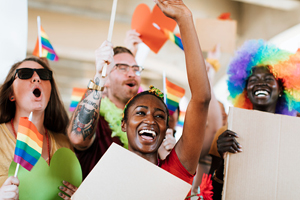
With Pride Month coming to a close as calls for systemic change rippling across the country, it’s time to examine intersectionality across both sexual and racial identities.
Black Lives Matter
The Black Lives Matter movement and LGTBQIA rights have a long and intricate history of being intertwined. Both groups struggle for liberation, and often face the same kinds of discrimination. Bayard Rustin, a Black gay man, organized the March
on Washington in 1963. Marsha P. Johnson was a prominent Black activist in the Stonewall uprising of 1969, largely seen as the catalyst for the gay rights movement in America.
And recently, a Black Trans March in Brooklyn, New York just weeks ago was a massive success, drawing over 15,000 participants.
Multifaceted justice
The approach for justice must be broader than just framing as a singular identity issue, because the fact is that identities are complex and composed of several facets. It’s impossible to support LGBTQIA rights but ignore the Black Lives Matter
movement -- because then what about
Iyanna Dior, a Black Trans woman who was beaten by
a mob just weeks ago? Or
Tony McDade, a Black Trans man shot and killed by the police earlier
this month? These victims were targeted in an environment that breeds a mixture of anti-black racism and transphobia.
There can be no hierarchy within these movements to determine which lives are more valuable. The bottom line is if not all of us, then none of us when it comes to liberation. That is the basis for intersectionality. So is your approach for
justice intersectional?
Looking forward